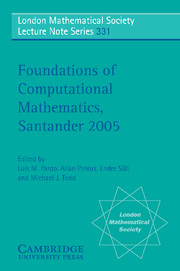Book contents
- Frontmatter
- Contents
- Preface
- 1 Non Universal Polynomial Equation Solving
- 2 Toward Accurate Polynomial Evaluation in Rounded Arithmetic
- 3 Sparse Grids for Higher Dimensional Problems
- 4 Long-time Energy Conservation
- 5 Dispersive Properties of Numerical Schemes for NSE
- 6 Eigenvalues and Nonsmooth Optimization
- 7 Discrete Noether Theorems
- 8 Hyperbolic 3-Manifolds and Their Computational Aspect
- 9 Smoothed Analysis of Algorithms and Heuristics
- 10 High-dimensional Transport-dominated Diffusion Problems
- 11 Greedy Approximations
Preface
Published online by Cambridge University Press: 13 May 2010
- Frontmatter
- Contents
- Preface
- 1 Non Universal Polynomial Equation Solving
- 2 Toward Accurate Polynomial Evaluation in Rounded Arithmetic
- 3 Sparse Grids for Higher Dimensional Problems
- 4 Long-time Energy Conservation
- 5 Dispersive Properties of Numerical Schemes for NSE
- 6 Eigenvalues and Nonsmooth Optimization
- 7 Discrete Noether Theorems
- 8 Hyperbolic 3-Manifolds and Their Computational Aspect
- 9 Smoothed Analysis of Algorithms and Heuristics
- 10 High-dimensional Transport-dominated Diffusion Problems
- 11 Greedy Approximations
Summary
The Society for the Foundations of Computational Mathematics supports and promotes fundamental research in computational mathematics and its applications, interpreted in the broadest sense. It fosters interaction among mathematics, computer science and other areas of computational science through its conferences, workshops and publications. As part of this endeavour to promote research across a wide spectrum of subjects concerned with computation, the Society brings together leading researchers working in diverse fields. Major conferences of the Society have been held in Park City (1995), Rio de Janeiro (1997), Oxford (1999), Minneapolis (2002), and Santander (2005). The next conference is expected to be held in 2008. More information about FoCM is available at its website http://www.focm.net.
The conference in Santander on June 30 – July 9, 2005, was attended by several hundred scientists. FoCM conferences follow a set pattern: mornings are devoted to plenary talks, while in the afternoon the conference divides into a number of workshops, each devoted to a different theme within the broad theme of foundations of computational mathematics. This structure allows for a very high standard of presentation, while affording endless opportunities for cross-fertilization and communication across subject boundaries.
- Type
- Chapter
- Information
- Foundations of Computational Mathematics, Santander 2005 , pp. vii - viiiPublisher: Cambridge University PressPrint publication year: 2006

